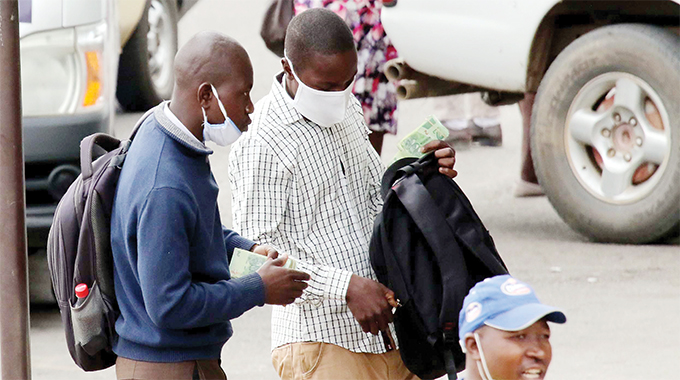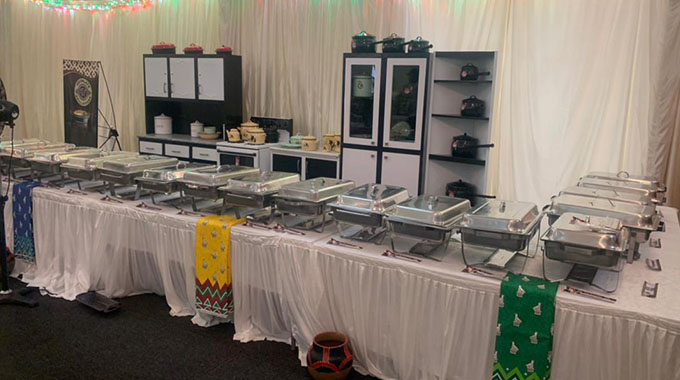Artistes’ new way of life

Showbiz Correspondent
For a long time, some people have been keen to know how much money local artistes make annually from shows and sale of their music/wares.
The artistes on their part, for reasons known by them, have kept this information closely guarded with the truth usually coming out after they die.
And with the coming of the Covid-19 pandemic which has seen most artistes getting affected as they can no longer conduct shows, people have been wondering how they are surviving, especially considering that most artistes rely on their talents for a living.
Saturday Leisure this week spoke to a couple of musicians, dance outfits and theatre practitioners to establish how they usually make their money and how they are getting by now since it is not business as usual.
Barefoot goddess, Ammara Brown said her money flow has been good as brand power is paying off for her as her brand revenue continues to be fruitful during this pandemic/lockdown period.
“I’m highly streamed and followed worldwide which translates wonderfully to my revenue streams. I’ve continued making money from performing online during quarantine. It started with a South African company: Joox and I’ve also been involved in various TV and social media campaigns for Covid-19, locally and internationally, which is of course, a revenue stream,” said the Mukoko hit-maker.
On how much she makes annually, Ammara said: “Every year, I make five figures (USD) from touring and appearances as Ammara costs four figures (USD) to hire.”
Quizzed if she was affected by piracy as most people locally consume their music from pirated outlets, Ammara said she had no issues with her music being pirated as it reaches a wider audience that way.
“I look at pirates as my worker bees. They get my music to places I cannot at a minimal cost to me. Quality physical copies cannot be found on the streets as they last a few weeks so the fan enjoys and then finds me online,” said Ammara.
Iyasa director Nkululeko Dube whose outfit has been in the game for two decades, without disclosing what his group is worth, said they staged about 90 international shows and over 50 locally. This year, it seems the group is doing well as they being invited to perform at a couple of shows that are taking place online.

Nkululeko Dube
He said:
“Last year, we had about 90 international shows and locally, well over 50. I can’t disclose the income as it’s against our policy but the ban of shows has seen us participate in online shows with some paid for and others promotional. The payments vary from client to client.”
He encouraged artistes to embrace online shows as they are now the new normal adding that what is left is for people to find ways to monetise them.
“Online shows are probably the new normal and we shouldn’t expect an on-and-off button to wish them away. We have to adapt or die. We have to find means to monetise them too and one of the ways is to attract the interest of advertisers. We also need to educate ourselves on how best we can make the online shows profitable. There are many ways of monetising content online but most of us are sometimes obsessed on numbers of views and likes at the expense of income,” said Dube.
Selmor Mtukudzi’s publicist Reginald Chapfunga said she had been affected by piracy as her recent album, Dehwe ReNzou which was released in January only sold about 5 000 discs with pirates getting the bigger chunk as they beat her to it by selling the pirated CDs at road junctions.

Selmor Mtukudzi
“I wouldn’t want to comment on the revenue we generated last year, but it was a busy year for us. The band had over 10 international shows and almost 40 local ones,” he said.
On cashing in from online shows, Chapfunga said: “The online shows have been a welcome development as we played at two such shows hosted by the National Arts Council and the other by Bulawayo Arts Festival.
“We really appreciate such initiatives though artistes are not making much out of them. But still, we want to applaud the promoters as they aren’t getting any revenue, but just assisting the artistes and keeping the show circuit live.”
Afro-house sensation Mzoe 7 said with the rise in popularity of online shows, they are hoping to get financial gain.
“With online shows, we’re hoping to get monetary value. I’ve had a few online shows since lockdown and there’s a big difference from what we used to get before lockdown.
“We’re hoping though that promoters and corporates come up with partnerships that will make online shows viable like in other countries,” said Mzoe 7.
High-rising dancehall musician Poptain through his manager Devon Petersen said appearances on online shows have greatly benefited him as he is making money.
“Last year, I was focused on making music so I only had about five shows where I was getting between $100-$200 per show. This year, I think there’s hope as the online shows I’ve been part of have been rewarding financially as I am getting appreciation gifts of about $150-$200.
“However, I’m sure some people are getting more but for me, the money is enough for now although it’s not something I can live off,” he said.
Gwanda-based GDA Fire trio through one of the members Mr Gibbonz said: “We had approximately 30 shows last year and managed to get around US$1 000 out of all the shows. We have had no monetary gains from the online shows we’ve taken part in as we’ve been funding ourselves.”
Cal_Vin said: “The money that we’re making is not enough and therefore in all honesty, there’s need for the corporate world to jump on board.”

Cal_vin
Umkhathi Theatre director, Matesu Dube said the lockdown had greatly affected them.
“We had estimated to have done a good number of shows by this time but the ZITF and Independence Day celebrations were cancelled. Online shows seem to have taken over the space although we haven’t done one yet.
“We’ve been working on an audio-visual play and are waiting for approval from our partners to air it online. However, we need to make these online shows pay us in a way because we are in the arts for business,” Dube said.
Dube said the payment for artistic value has never been enough especially in this country thus the need to embrace the new normal and come up with ideas that can work in this era.
Jah Prayzah who launched his album online recently, said it is important for people to adapt to staging shows online as that is where their money will soon be coming from in the new way of life.
“Online shows are now the way to go and if people realise that this is the new normal, they’ll be able to start charging exactly what they deserve. For us, these shows have been good (financially), but obviously, they cannot replace physical concerts,” said Jah Prayzah through his manager, Keen Mushapaidze.











Comments